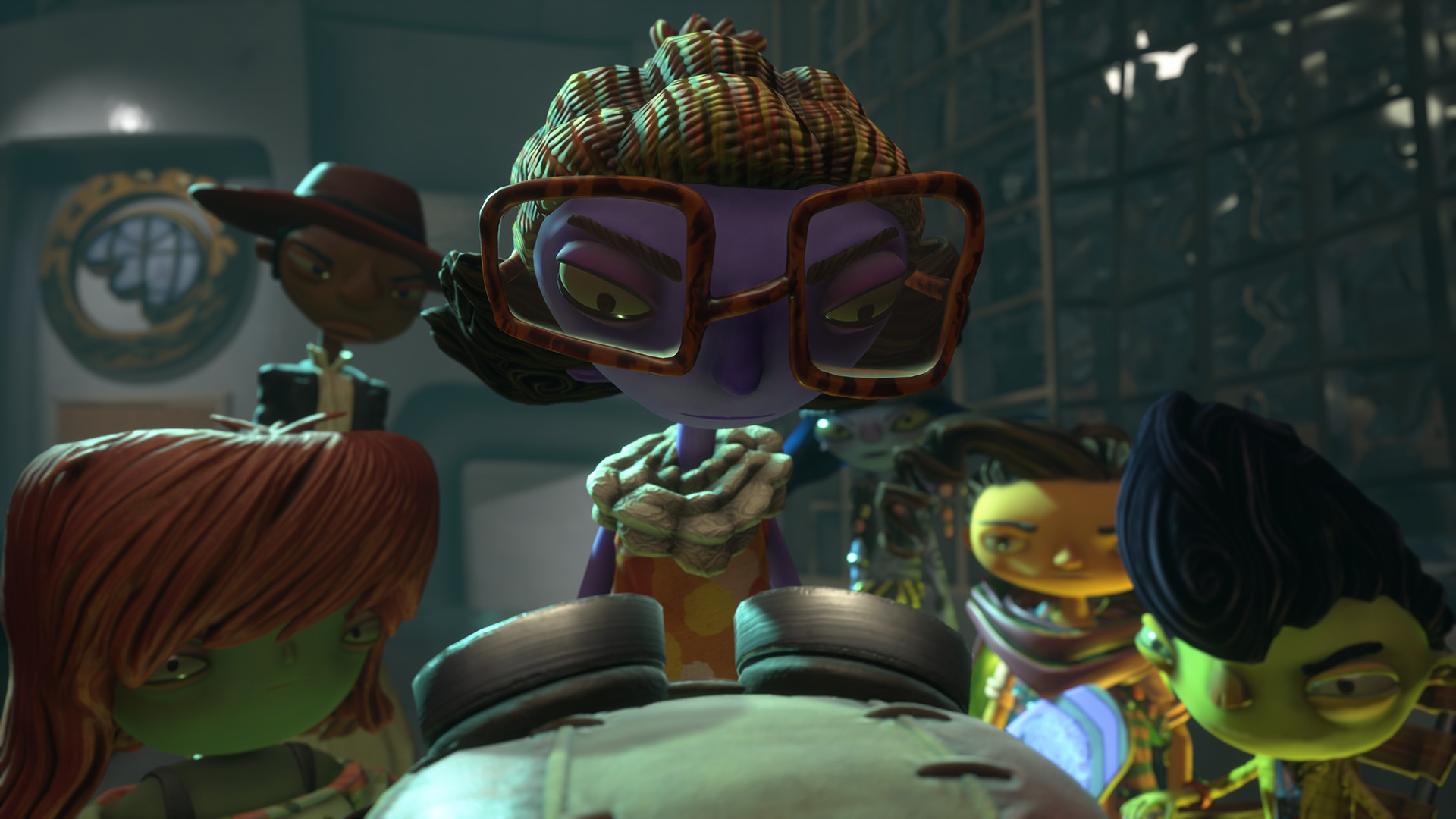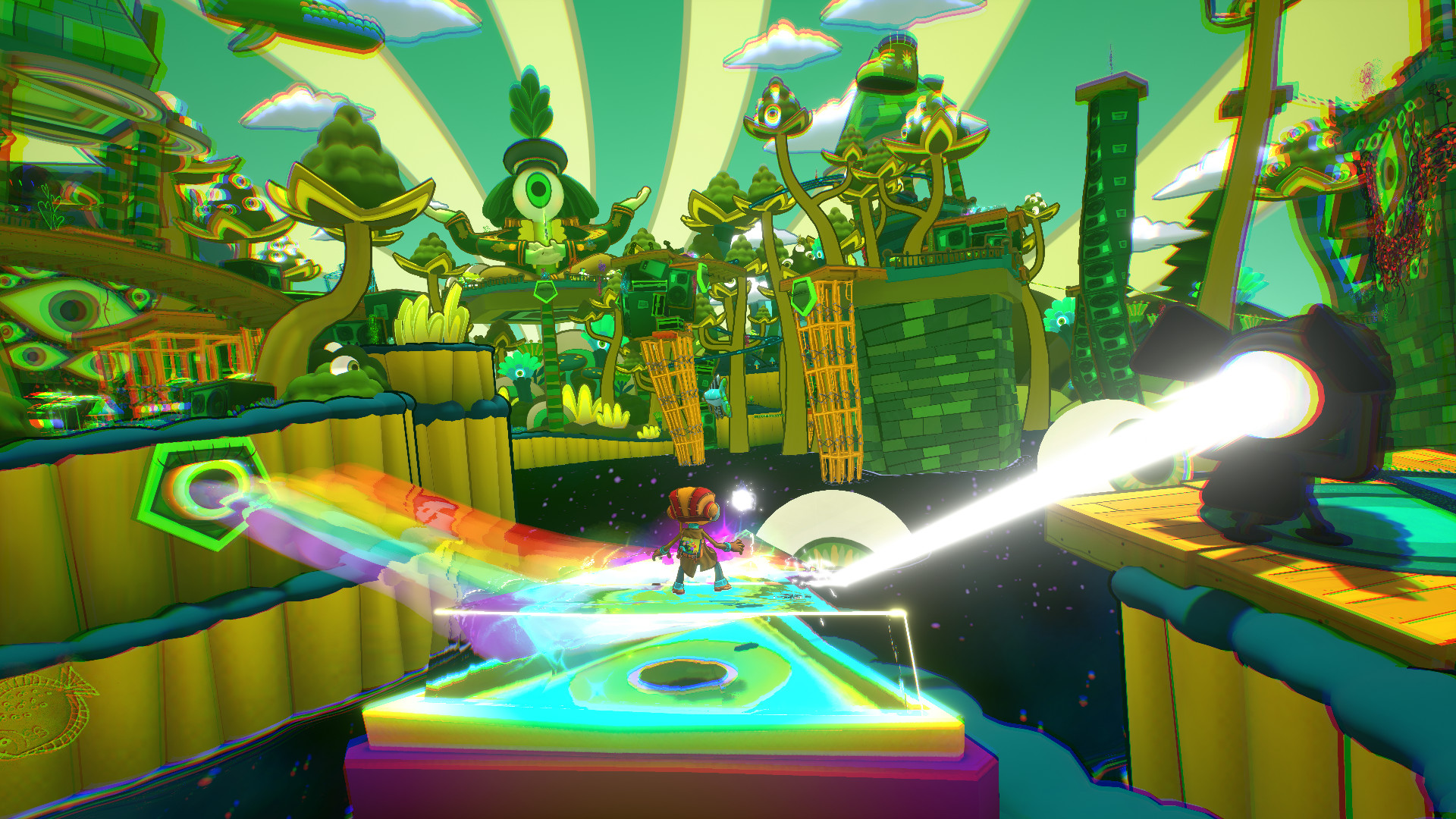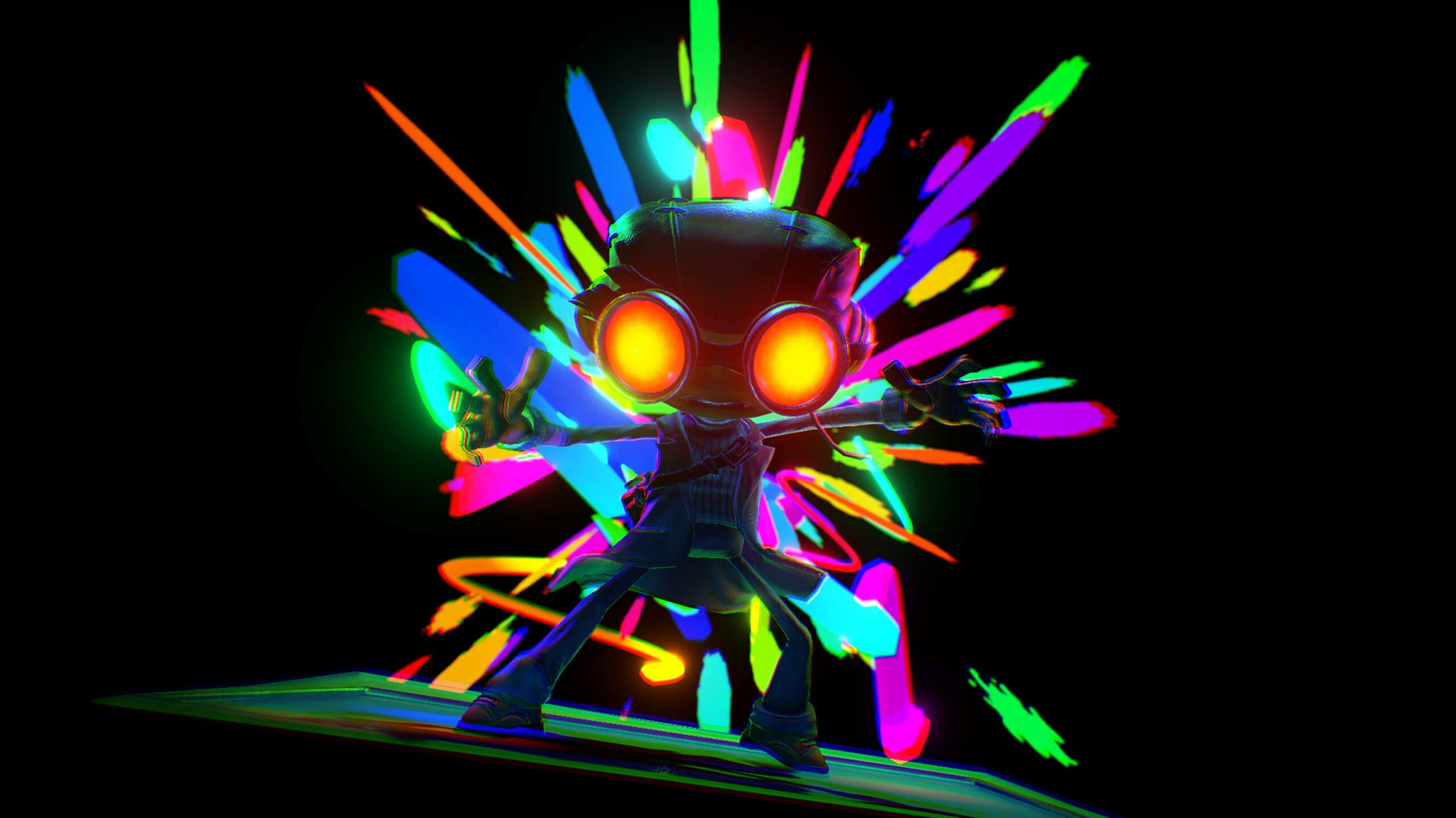
As its name suggests, the initiative is an annual tradition aimed at bringing together communities, schools, workplaces and more to promote and protect people’s mental wellbeing. This endeavour has been made all the more crucial after over a year of the COVID-19 pandemic, with 40 percent of Canadians alone reporting worsened mental health during this time.
“…the second game has a lot more positive depictions of people going through mental conditions and also goes a lot deeper.”
For this reason, many people have turned to video games for much-needed escapism. In Canada, 65 percent of adults and 78 percent of teens reported that playing games has made them feel better during the pandemic, according to a November study from the Entertainment Software Association of Canada. Whether it’s the relaxing, laidback nature of Animal Crossing or the social multiplayer experiences of Jackbox, you’ll likely find solace in at least one kind of game.
But what about games that actually try to tackle themes of mental health directly?
Teaching empathy through gaming
Mental health is one of the main focuses of Psychonauts 2, Xbox-owned developer Double Fine‘s upcoming sequel to its 2005 fan-favourite platformer Psychonauts.
The game follows talented acrobat Raz as he uses his psychic abilities to delve into the minds of others to help them overcome their troubles and, ultimately, fulfill his dream of joining the international psychic espionage organization, Psychonauts. In Psychonauts 2, Raz must now weed out a mole in the Psychonauts before they can bring back the evil Maligula from the dead.
For legendary games designer Tim Schafer, Double Fine founder and co-writer/director of Psychonauts and Psychonauts 2, video games like Psychonauts can be a powerful and effective platform through which more serious subject matter can be thoughtfully explored.
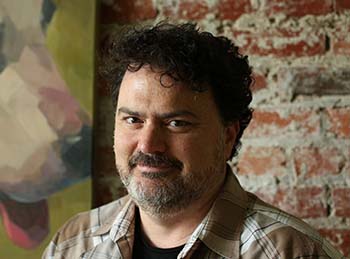
Double Fine founder, Tim Schafer.
“Like any work of narrative art, [gaming] lets you roleplay different situations, and sometimes they’re situations [in which] you wouldn’t be comfortable in your own life,” Schafer tells MobileSyrup.
“And I’m not talking about just like jumping off a building and shooting a web at another building like — not just things that are impossible, but things that are uncomfortable for someone to go through, like emotional or social situations. Games, just like any great work of art, can do that, but because you’re playing the game, it allows you to control what’s going on in the situation, which is part of feeling safe and being safe enough to be experimental.”
In the Psychonauts series, you see what Schafer’s talking about represented by Raz’s exploration of characters’ different mental states, which, in turn, helps you better understand them.
“We all have our own experiences with our own mental health, and we have experiences with the mental health of loved ones that have affected us or have been challenging to us or certain things we’ve gone through and dealt with,” says Schafer. “So the game deals with that by letting you see inside other people’s minds and see their mental worlds, which is taking empathy as an abstract concept and making it gameplay — making you actually go and see what someone’s dealing with.”
This includes characters dealing with the likes of loss, low self-esteem or paranoia, all represented through carefully designed platforming and puzzle sections.
“You often meet somebody who’s ‘a monster,’ or someone who’s behaving badly or a villain, but then you go into their head and you see what they’re struggling with,” explains Schafer. “You see some of the roots of their problem, which doesn’t necessarily explain everything away, but it definitely lets you understand them more — not as a two-dimensional villain, but as a person who either has a past trauma or has some sort of different perception of the world that causes this behaviour.”
Getting better, step by step
Although the original Psychonauts has a dedicated fanbase in no small part thanks to its handling of mental health themes, Schafer admits that this was something of an “accident.”
“I was much younger when I wrote the first game,” he says with a laugh. “There are some representations of mental health-related issues that I feel like in the first game, we wanted to do better than that. So the second game has a lot more positive depictions of people going through mental conditions and also goes a lot deeper — it goes into things like addiction and post-trauma-type situations where we kind of deal with them head-on.”
To achieve this, Double Fine had to depend primarily on itself when getting started on Psychonauts 2 in 2015.
“In the early days, when we were just a scrappy, independent studio, it was a little more ad hoc, but it was also based on personal experience,” says Schafer. “We found that people started coming forth with private stories about dealing with mental health concerns, so we relied on the expertise of the team at first to make sure it was kind of a story told from the heart.”
However, Microsoft’s 2019 acquisition of Double Fine partway through Psychonauts 2‘s development meant that the studio suddenly had access to more resources and professionals to consult on the game’s depiction of mental health struggles.

Raffael Boccamazzo, a doctor of clinical psychology and clinical director of Take This.
One of these collaborators was Raffael Boccamazzo, a doctor of clinical psychology and clinical director of Take This, a U.S. non-profit focused on combating stigma and increasing support for mental health initiatives in gaming. While Boccamazzo notes that his involvement came later in the project, he’s still happy with how the game is shaping up.
“I had some critical things to say about some nuanced topics within the game, and given the stage of development, there are things that aren’t going to be able to be fixed. But I very much got the sense that the studio team wants to do the best job possible and still tell a great story,” said Boccamazzo in a Take This video.
“Even if they can’t change those things in this game, they’re going to carry those lessons forward and apply what we gave them as feedback into future games […] We’re going to [get] better games that better represent mental health challenges in a helpful and uplifting tone while still being fun to play.”
Boccamazzo praised Psychonauts 2 for its “creative and humourous portrayals of mental health obstacles as enemies,” specifically citing one foe that’s based on panic attacks. “Largely due to my struggles with autism, I’ve had panic attacks for most of my life, and from that perspective, their portrayal of panic attacks as a frenetic blackness of shimmering rainbow energy — something about that just rang very true to me.”
You’re not alone
Of course, the mental health of Double Fine itself is also important, especially amid the trials of remote work during the pandemic. While Schafer stresses that the specific design facets of Psychonauts 2 were locked in before COVID-19 — and, therefore, remain unchanged by it — he says the general experience has made him more introspective.
Given both the game’s weighty subject matter and the unprecedented circumstances surrounding development, Schafer says he’s made sure to regularly hold virtual social events — including one for Double Fine’s 20th anniversary with the owner of the team’s frequented Mexican restaurant — to keep spirits high.
“I’m trying to remind everybody about what was good about the world that we’re shut off from now and each other,” he explains. “Because I think it is natural for someone who’s pretty introverted like me to, in some ways, relish the isolation of, ‘I don’t have to go anywhere, I don’t have to go to parties anymore.’ It’s very easy to slip into that and feel that you didn’t need all that stuff, but then just [get] a little hint of it to remind you, ‘that’s right, it’s really rewarding, people are really rewarding to deal with.'”
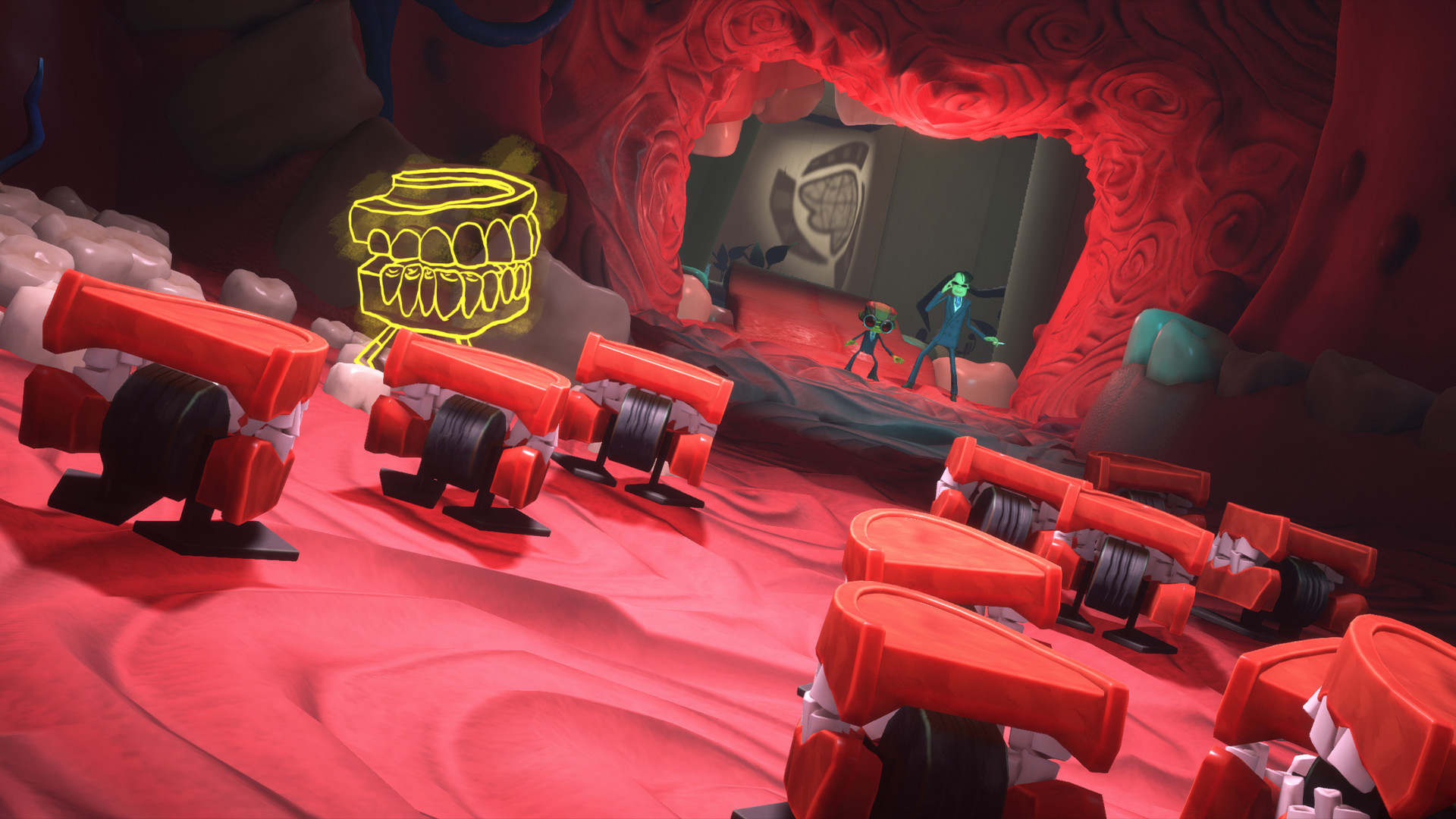 In a way, this is an interesting case of life imitating art, as Psychonauts 2 is also ultimately about finding the light in the dark. That Psychonauts 2 strikes this “hopeful and helpful” tone is especially crucial, according to Boccamazzo.
In a way, this is an interesting case of life imitating art, as Psychonauts 2 is also ultimately about finding the light in the dark. That Psychonauts 2 strikes this “hopeful and helpful” tone is especially crucial, according to Boccamazzo.
“A lot of the mental health portrayals that we see at Take This that people are making are just horrible — they’re hopeless. In these things, it’s like if you have a mental health challenge, you’re doomed forever.”
To be sure, he notes that there is value in “gritty and evocative stories,” pointing to an “incredibly touching and really evocative” scene in Psychonauts 2. “We go from this scene of overstimulation of every sense available to just silence, and one of the characters involved just pleads with [Raz], ‘let’s just stay here, it’s quiet.’ I started crying when I saw that — it was incredibly touching.”
“To me, it’s not even a balancing act, it’s just about life experience.”
But he says the heavier moments don’t drown out Psychonauts 2‘s otherwise optimistic themes. “One of the things I liked about the game was that everyone was capable of being helped in the end. and that’s awesome. In every single level, there’s the possibility of helping people, and that reflects the reality of most mental health challenges because most people, with the right supports, can live thriving, fulfilling lives.”
Schafer admits that rooting the seriousness of mental health struggles in Double Fine’s signature levity was “a tricky line to walk,” but he feels that this approach ultimately feels truer to what people go through.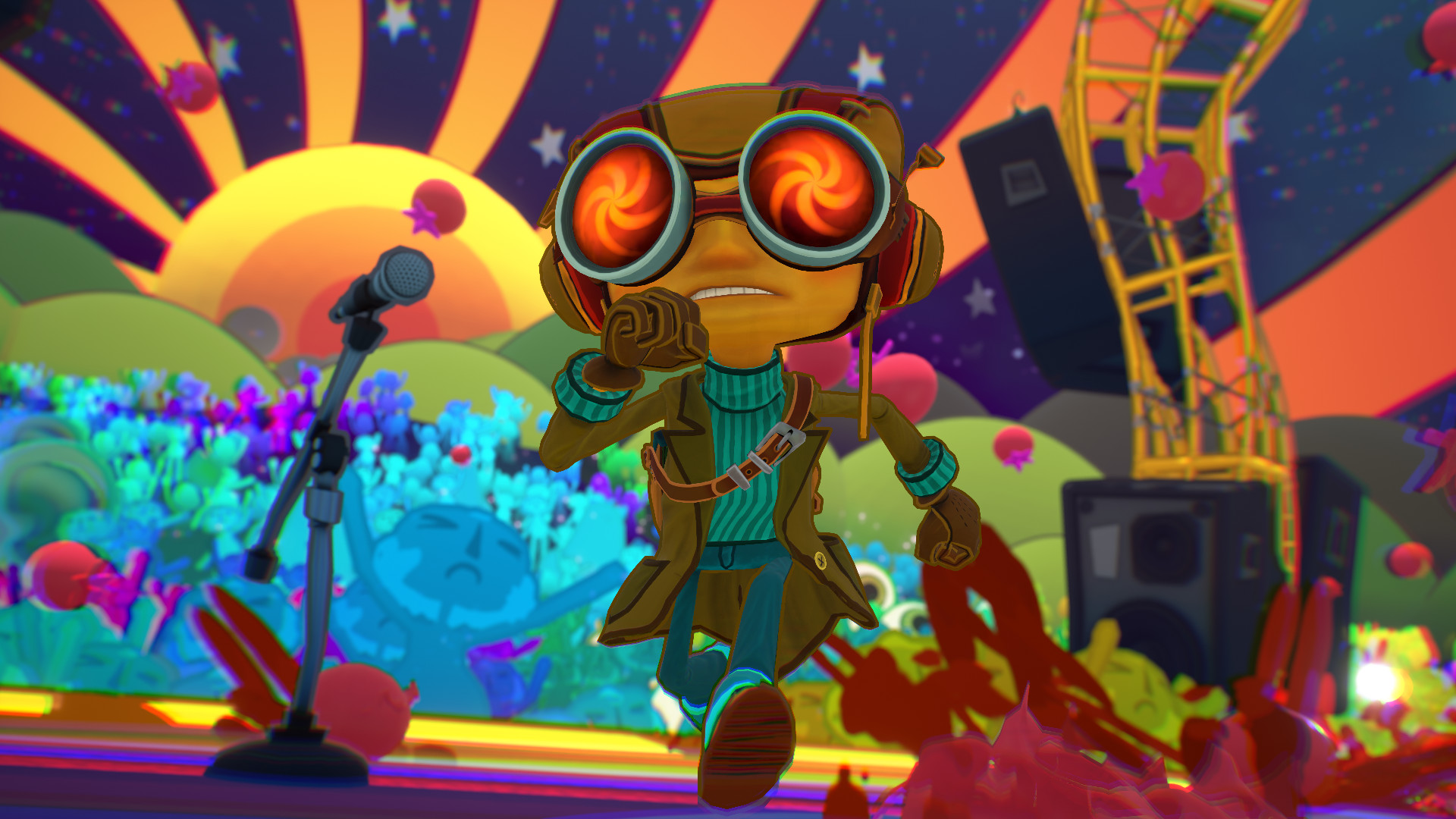
“To me, it’s not even a balancing act, it’s just about life experience. I was inspired by the writing of Kurt Vonnegut in high school when I first got interested in reading and writing, and I was always struck by how funny his books were, but also, they just went right for the human experience, even when it’s really ugly, and really mean,” Schafer explains.
“It seemed like, you know, ‘is life funny, or is life sad?’ I mean, both are true at the same time. And I think that’s the human experience, which is what we’re going for with art and with this game.”
Psychonauts 2 will release on August 25th on Xbox One (and Xbox Game Pass on day one), PlayStation 4 and PC.
This interview has been updated for language and clarity.
Image credit: Microsoft
Canadians: if you or anyone you know is in crisis, please call the Canada Suicide Prevention Service at 1-833-456-4566 toll-free (1-866-277-3553 for Quebec) or visit www.crisisservicescanada.ca for 24/7 support.
Those in the U.S. can call 1-800-273-8255 or visit the National Suicide Prevention Line’s website.
Update: 13/06/2021 — This story has been updated with an official release date for Psychonauts 2.
MobileSyrup may earn a commission from purchases made via our links, which helps fund the journalism we provide free on our website. These links do not influence our editorial content. Support us here.

